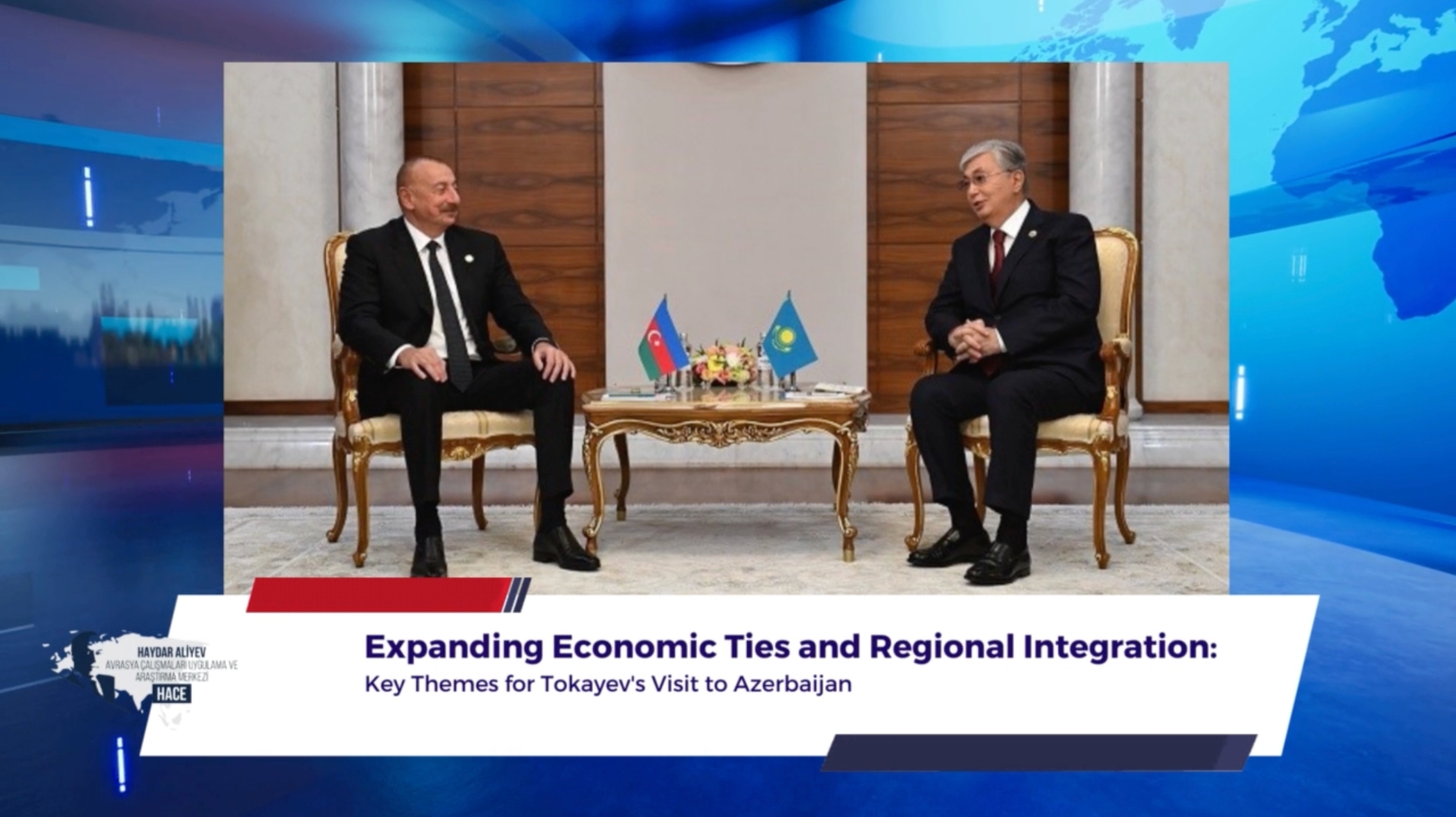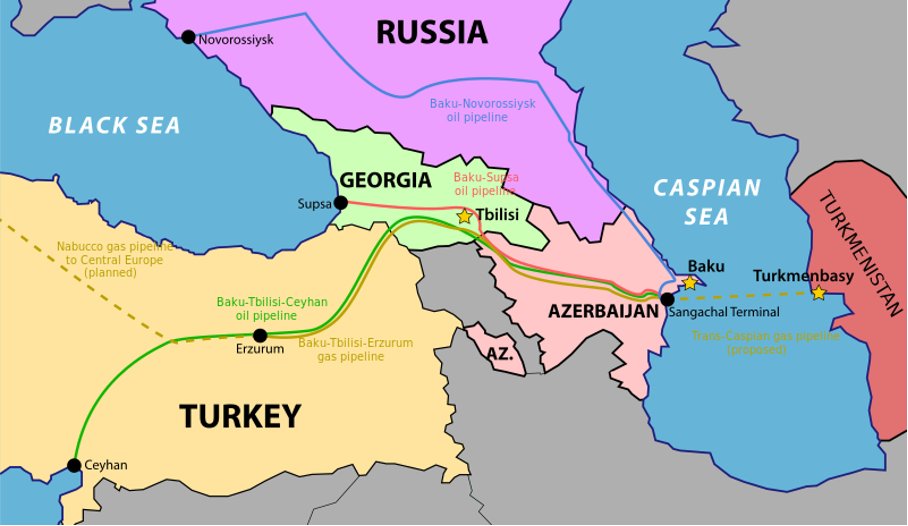


During President Tokayev's visit to Azerbaijan on March 11-12, 2024, discussions are anticipated to cover a range of topics including the enhancement of economic cooperation and the execution of projects within the Middle Corridor. This initiative is significant as it links China and Europe, along with the European Union and Turkey with Central Asia. Key topics on the agenda include the augmentation of Kazakhstan's oil exports through Azerbaijan to European markets, broadening of trade and economic relations, and the signing of a military intelligence cooperation agreement in the realm of defense. President Tokayev's visit is aligned with Azerbaijan's foreign policy priorities, as outlined by President Ilham Aliyev in his inaugural address following his February 2024 election victory, focusing on bolstering relations with Turkic states. The connection between Tokayev's visit to Baku and Aliyev's subsequent state visit to Turkey underscores the strategic alignment between these engagements.
The visit is poised to concentrate on fortifying economic bonds and enhancing trade, a theme recurrent in the dialogues and declarations of the presidents. Azerbaijan's engagement in investment ventures in Central Asian nations suggests an eagerness to deepen cooperation with Kazakhstan. President Aliyev highlighted at the 5th Consultative Meeting of Central Asian Leaders the substantial growth in Azerbaijan's trade with Central Asian countries, marking a threefold increase in 2022 and a further 50% in the initial seven months of 2023. Recent initiatives have aimed at reinforcing strategic partnerships and economic ties, with significant milestones including the signing of several agreements during President Tokayev's August 2022 visit to Baku. These agreements, covering trade-economic cooperation, cultural exchange, digital development, transport, and transit cargo, aim to elevate mutual trade to one billion dollars annually. The trade and economic cooperation agreement encourages direct contact between the economic entities of both countries and promotes trade through various events, indicating potential discussions on further developing business contacts and creating an economic cooperation roadmap during Tokayev's visit. The visit is expected to see participation from ministers and business delegations, reflecting its importance.
Furthermore, President Aliyev underscored the significance of industrial cooperation, including sectors like machine building, the auto industry, shipbuilding, agriculture, and more, during the 5th Consultative Meeting of Central Asian Leaders. Kazakhstan's interest in expanding exports to Azerbaijan in areas such as metallurgy, petrochemicals, the food industry, and others is anticipated to be a discussion point. Additionally, the development of transport and logistics routes was highlighted as a priority, further emphasizing the multifaceted economic ties being fostered between the two countries.
The collaboration between Kazakhstan and Azerbaijan in the areas of transport and logistics encompasses a broad spectrum of topics for discussion. These include the execution of a roadmap aimed at the synchronous removal of bottlenecks and the development of the Middle Corridor, which traverses through Kazakhstan, Azerbaijan, and Turkey from 2022 to 2027. Other significant topics are the transportation of Kazakh oil to Europe, the conveyance of hydrogen from Central Asia, and the ambitious project to construct joint fiber-optic communication lines along the Caspian Sea bed, linking Kazakhstan with Azerbaijan. A significant advancement in the bilateral logistics and transportation relationship is the launch of a new ferry service. The Ro-Pax ferry "Zarifa Aliyeva," operated by the Azerbaijan Caspian Shipping Company (ASCO), embarked on its inaugural journey from the port of Baku in Azerbaijan to the port of Kuryk in Kazakhstan. This ferry initiative aims to bolster maritime-rail transport across the Caspian, improving the trade and transportation nexus between the two nations. With a capacity to transport 100 passengers, 56 railcars, and 50 truck trains, including hazardous cargoes, this development marks a pivotal moment in their logistical and transport collaboration.
Regarding the enhancement of Kazakhstan oil transportation through Azerbaijan, it is crucial to focus on two routes: the Baku-Tbilisi-Ceyhan and Baku-Supsa pipelines. An agreement is already in place to transport 1.5 million tons of Kazakh oil via the first route. In a February interview with Rompetrol, Kazakhstan's Energy Minister disclosed that KazMunayGas and SOCAR are exploring the potential to increase the transit volume to 2.2 million tons per year in the BTC direction. As for the Baku-Supsa route, efforts to investigate the feasibility of transporting up to 5 million tonnes of oil through this pipeline are ongoing. While the Baku-Supsa pipeline might be perceived as less profitable compared to the Baku-Tbilisi-Ceyhan, it remains unused at present, prompting Azerbaijan to encourage Kazakhstan to utilize this route actively. A distinct advantage of the Baku-Supsa pipeline is its exclusivity for Kazakh oil, in contrast to the Baku-Tbilisi-Ceyhan pipeline, which has handled oil from both Kazakhstan and Azerbaijan, posing challenges due to the differing oil qualities from these two countries.

During President Tokayev's visit to Azerbaijan, discussions on military cooperation are anticipated, possibly involving the Kazakh Minister of Defense or a representative from the ministry. A focal point of these discussions will be the finalization of a defense cooperation agreement, specifically in the realm of military intelligence. The draft of this agreement, which emphasizes the mutual exchange of military information concerning terrorist and extremist organizations, has been made available on Kazakhstan's public platform for normative-legal documents. With the signatures of the defense ministry leaders from both Kazakhstan and Azerbaijan required, the agreement's signing is a likely event during the visit. This visit may also pave the way for discussions on collaborative initiatives in the Caspian Sea and the planning of the "Birlestik" military exercise in Kazakhstan. This exercise is set to include participation from the armed forces of Azerbaijan, Kazakhstan, Kyrgyzstan, Uzbekistan, and Tajikistan, highlighting the broad scope of military collaboration among these nations.
President Tokayev's visit to Azerbaijan marks a significant milestone in the continuous effort to deepen ties between Kazakhstan and Azerbaijan, reflecting a broader ambition towards regional integration and the strengthening of economic, logistical, and military cooperation. This visit, underpinned by a series of discussions on a wide array of strategic topics, underscores the mutual commitment to enhancing economic collaboration, developing critical infrastructures such as the Middle Corridor, and advancing military intelligence cooperation.
In essence, President Tokayev's visit encapsulates the dynamic and multifaceted nature of Kazakhstan-Azerbaijan relations, driven by a shared vision for economic growth, regional connectivity, and security cooperation. As both nations continue to build on their strategic partnership, the outcomes of this visit are likely to have far-reaching implications, not only for Kazakhstan and Azerbaijan but for the broader Central Asian and Caucasus regions, reinforcing their role as pivotal players in fostering regional integration and cooperation.